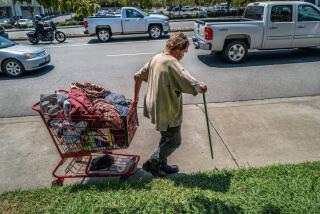Capitol Journal: Aid-in-dying bill will be revived
An emotionally charged aid-in-dying bill is seriously ailing in the California Legislature.
It soon could go into a deep coma.
The measure, which would allow terminally ill people to end their lives with a doctor’s help, passed the Senate last month on essentially a party-line vote, 23-15 — Democrats for, Republicans against.
Because the bill whips up emotion about morality based on religious beliefs and raises questions concerning medical ethics, it makes many legislators uncomfortable politically and personally.
The proposal is slated for its first Assembly hearing Tuesday in the Health Committee. But sponsors say it’s short two to five votes. Ten are needed to clear the 19-member panel.
A handful of Southern California Democrats, mostly Latinos under pressure from the Catholic Church, are withholding support.
Sponsors have already delayed the committee hearing once. And they say that unless enough votes surface by Tuesday, they’ll put the bill on life support until at least late August, but probably until next year.
“If we don’t have them in the can, we’re not going to allow a ‘no’ vote,” says Sen. Bill Monning (D-Carmel), who is coauthoring the bill with Sen. Lois Wolk (D-Davis).
“We’re not seeking to change Catholic doctrine,” Monning adds, “but we don’t think Catholic doctrine should prevent someone from choosing this option for their end of life.”
Gov. Jerry Brown, a one-time Jesuit seminarian, hasn’t taken a position.
The bill, modeled after an Oregon “death with dignity” law, would permit Californians with less than six months to live to take lethal drugs prescribed by a doctor. There’d be lots of protections against abuse.
Two physicians would have to confirm a patient’s prognosis of less than six months to live, plus the person’s mental competence. The patient would need to make two oral requests to a physician at least 15 days apart, with witnesses. The doctor and patient must meet once alone, but a translator could be present. It would be a felony to coerce someone into requesting the drugs. And the medication would have to be self-administered.
To protect hospitals and physicians from acting against their beliefs, none would be required to participate.
That’s why the powerful California Medical Assn., which strongly opposed such legislation in previous years, has now gone neutral. “We believe it is up to the individual physician and their patient to decide,” the group declared in May.
Oncologist groups, however, still oppose the bill, SB 128. So do disability activists.
The big inspiration for this bill was Brittany Maynard, 29, a terminally ill Californian who moved to Oregon last year to end her life rather than keep suffering pain and debilitation from aggressive brain cancer.
Last week, I heard from another brain cancer victim, Michael Saum, 35, of El Monte. But Saum wasn’t moving to Oregon. “I don’t have time,” he said. Someone has to live there six months to benefit from the law. “My hospice doctor says I could go any moment.”
Saum recently took part in a rally trying to drum up legislative support for the California bill.
“I’m tired of suffering,” he told me. “I have severe, constant headaches. My stomach is constantly nauseated. My brain no longer regulates my body temperature. I have a hard time breathing. My legs hurt. Everything hurts. I have short-term memory loss. I keep asking the same questions over and over. I want to sleep but am in too much pain.”
“It’s ridiculous,” he said, that California doesn’t have a law like Oregon’s.
Most Democratic holdouts on the Health Committee are communicating publicly only through their aides.
Assemblywoman Lorena Gonzalez (D-San Diego) is opposed “based on personal experience” but hasn’t elaborated, her top aide says.
Assemblyman Jimmy Gomez’s father was given only a few months to live because of pancreatic cancer and died. That affects the Echo Park Democrat’s thinking, a spokesman says, but he is studying the bill and hasn’t decided.
Neither has Assemblyman Roger Hernandez (D-West Covina). Democratic Assemblymen Freddie Rodriguez of Pomona and Miguel Santiago of Los Angeles also are not supporting the bill, its backers say.
Assemblyman Sebastian Ridley-Thomas (D-Los Angeles) did agree to talk. “I’m not comfortable with it,” he said. “Medicine is organized to promote wellness, not death.” The lawmaker said he would prefer to expand hospice and palliative care.
Los Angeles Archbishop Jose H. Gomez is actively opposed. “The compassion that doctor-assisted suicide offers is hollow,” he wrote in a church column last week. “Helping someone to die — even if that person asks for that help — is still killing. And killing is not compassion. It is killing.... Killing the people we find too difficult, too burdensome or too expensive to care for.”
But another Catholic, legendary farmworker union co-founder Dolores Huerta, has been visiting legislators and urging their support.
“They tell me they’re not going to vote because they’re Catholic,” Huerta says. “I’m saying to them it’s up to other people to make their choice. We should not get in the way.
“I’m a Catholic — Catholic in my mind, in my heart. I go to Mass. But I should not impose my religious beliefs on everyone else. People ought to be able to end their life in dignity.”
Amen.
Even if this bill goes on life support, it will be revived and eventually become law. Polls show overwhelming public support. And in this country, usually, the people ultimately rule.
Twitter: @LATimesSkelton
More to Read
Start your day right
Sign up for Essential California for news, features and recommendations from the L.A. Times and beyond in your inbox six days a week.
You may occasionally receive promotional content from the Los Angeles Times.







